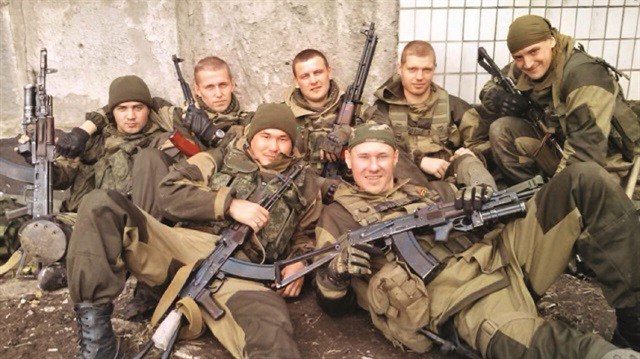
Russia Pushes CSTO Countries to Legalize Private Military and Security Companies
Publication: Eurasia Daily Monitor Volume: 15 Issue: 31
By:

The Secretariat of the Collective Security Treaty Organization’s (CSTO) Parliamentary Assembly is currently examining a bill on private military and security organizations (Private Military Companies—PMC) (RIA Novosti, February 5). If adopted inside the Moscow-led alliance, the individual CSTO member states will then be tasked with introducing domestic laws to legitimize the activities of such commercial paramilitary groups.
This issue is relatively new to all CSTO countries except Russia. In 2012, Russian President Vladimir Putin expressed full support for establishing an official PMC system in his country. Since that time, however, the Kremlin has experienced certain difficulties in dealing with these organizations. On the one hand, the country has widely relied on PMCs—for example, Slavonic Corps Limited as well as Wagner Group (Vz.ru, February 21)—in Ukraine, Syria and, according to some reports, Sudan (UAWire, December 5, 2017) to protect “its national interests and people.” But on the other hand, Russia’s Penal Code officially still prohibits citizens from becoming mercenaries—Russians face three to seven years of imprisonment for participating in a foreign armed conflict or military operation outside the regular Armed Forces.
Whereas the Russian parliament has been unsuccessfully trying to legalize PMCs for the past five years, the country’s Federal Security Service (FSB) and Ministry of Defense have more recently stepped up their own efforts to push through the law (Rosbalt, February 19). And in January 2018, Russian Foreign Minister Sergei Lavrov also announced the need to legally protect Russians who participate in PMCs outside the country (RBC, January 15). Finally, the growing number of incidents of regular Russian military personnel killed in Syria (see EDM, January 11, 16, 17, February 8) has put increasing pressure on the Kremlin to provide additional support to the Armed Forces fighting abroad.
Whereas the exact text of the proposed CSTO law on PMCs is unavailable, Victor Ananiev, the director of the Moscow-based Institute for Security and Sustainable Development, which was in charge of drafting this legislation, has outlined some key features found therein. First, the document apparently denotes non-combatant status on such organizations. However, this point is still unclear, particularly since Russian State Duma representatives believe PMC personnel could protect allies from external aggression and participate in counter-terrorism operations—meaning they would effectively have to have combatant status (Dailystorm.ru, January 18).
Another issue involves the potential social benefits a person receives while working for private military and security companies. For instance, the draft law mandates that a PMC contractor receive compulsory insurance in case of death, injury or damage, kidnapping and ransom demands, even if serving in a foreign country. In addition, there is a proposal to legally consider service with a PMC as work experience. Such regulations would clearly be quite attractive for experienced and mid-level professionals as well as young men: currently, over five million retired and former military personnel face social and economic hardships in Russia (Rosbalt.ru, February 19).
Additionally, the draft legislation on PMCs outlines minimum qualifications for taking on such work. It appears those qualifications are relatively minimal, open to any 18-year-old (or older) citizen from a CSTO-member country who has completed at least vocational training and successfully passed the necessary exams (Pnp.ru, February 5). In the future, it could mean that, in particular, both young and middle-aged men from Kyrgyzstan and Tajikistan, for instance, may be interested in signing contracts to serve with regional PMCs, based on promises of more lucrative salaries.
Finally, the document clarifies potential customers of PMC services. They can be state executive bodies, foreign government agencies on the basis of bilateral agreements, and international organizations. It remains unclear what specific categories of international organization will legally be allowed to make use of the services of private military and security companies within the CSTO—and what duties undertaken by the PMCs in those situations will be legally valid. However, according to CSTO vice chairman Valery Semerikov, the organization is planning to establish its own peacekeeping forces that will be able to operate under the a United Nations mandate (Mir24.tv, February 8).
For now, the PMC law under discussion by the CSTO member states remains quite ambiguous. Yet, there are already various questions in the region regarding Russia’s goals and motivation behind pushing this idea on the entire bloc. It seems pretty clear that this alliance directive will speed up Russia’s ongoing domestic debate about passing its own PMC law. And Russia may want to employ PMCs in Afghanistan in the near future (Ratel.kz, February 20). Moreover, Moscow’s apparent expectation that PMCs might be employed against external aggressors or in counter-terrorism operations raises the question of whether their functions might significantly overlap with the already existing Collective Rapid Reaction Force within the Russia-led regional alliance. At the same time, the overall initiative brings to mind the Kremlin’s repeated attempts to push other CSTO countries into sharing more security responsibilities in Russia’s broader neighborhood. Of particular note were Russia’s unsuccessful efforts to involve CSTO countries in a UN peacekeeping force in Ukraine as well as Moscow’s wish to send military troops from Kazakhstan and Kyrgyzstan to Syria (Ktk.kz, June 23, 2017). Finally, as noted above, the Kremlin has increasingly come to rely on PMCs in various “hybrid” (New Type) warfare scenarios and other regional conflicts.
Clearly, even as they discuss Moscow’s PMC initiative within the CSTO, Russian allies will need to be wary of the potential challenges they could increasingly face in supporting Russian operations abroad.



